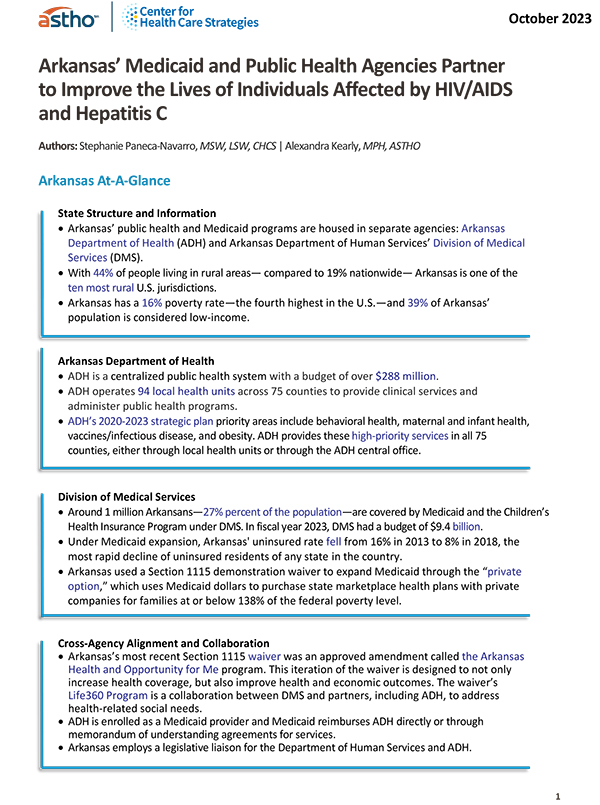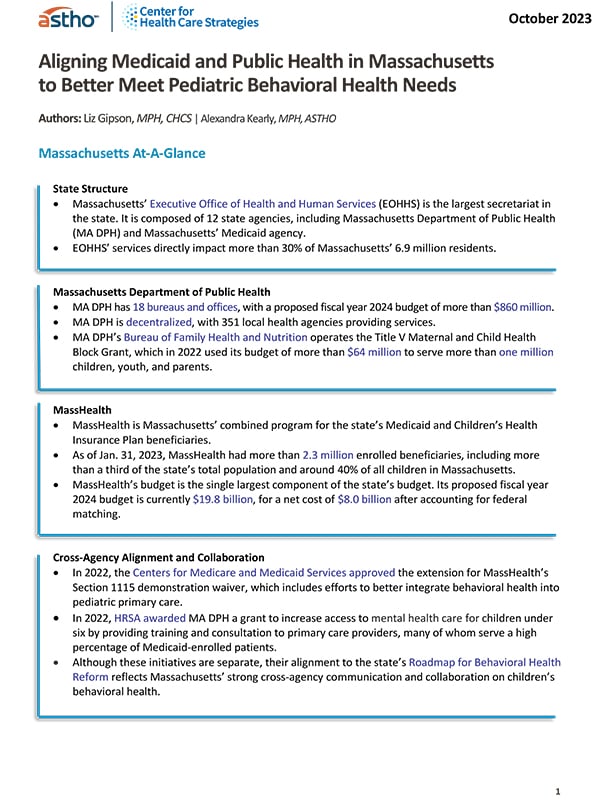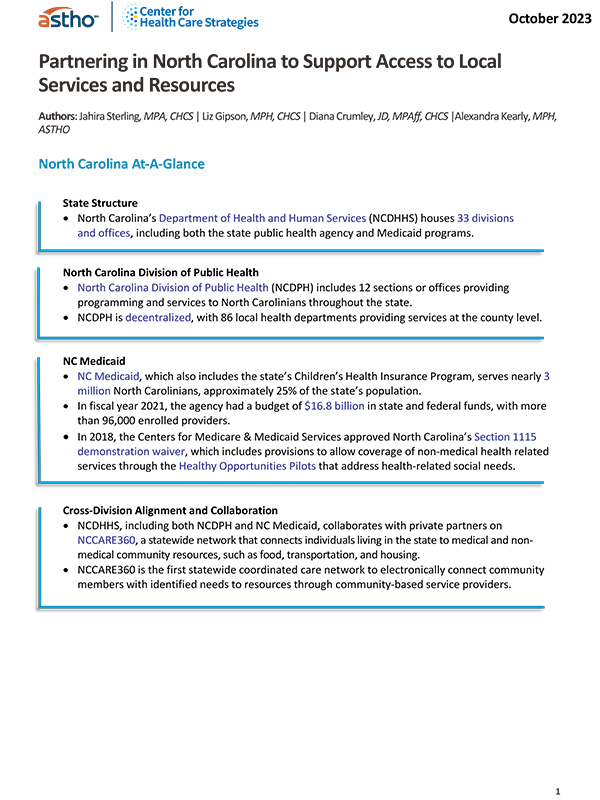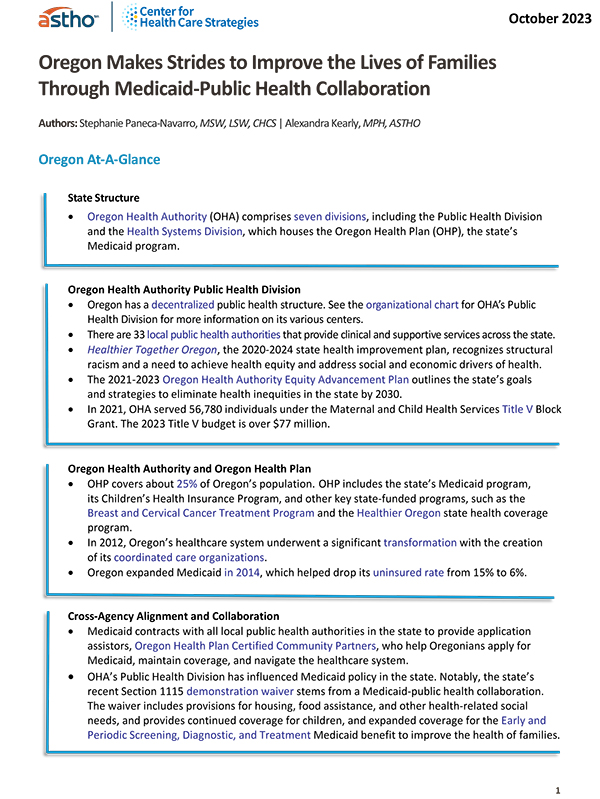Strengthening the Role of Public Health Agency Officials in the Health Safety Net System
October 30, 2023
ASTHO and the Center for Health Care Strategies interviewed or surveyed staff from public health and Medicaid agencies in Arkansas, Massachusetts, North Carolina, and Oregon to understand the ways in which the two agencies collaborate to deliver clinical services and shape and implement policies in the health care safety net system. The four states were selected for their geographic, political, and programmatic diversity, as well as to learn more about if and how their recently approved Medicaid Section 1115 demonstration waivers or extensions were influenced by S/THA staff or programs.
 This report details the value of public health agencies in informing Medicaid policies and programs. Key findings include:
This report details the value of public health agencies in informing Medicaid policies and programs. Key findings include:
- State and territorial public health agencies are an integral part of the health care safety net infrastructure and play a key role in addressing medical and social needs to promote population health and advance health equity.
- State and territorial public health agencies can leverage their population health and health equity expertise to inform health policy, including Medicaid policies and programs.
- State and territorial public health agencies can maximize existing opportunities and leverage federal funding to partner with Medicaid agencies on strengthening safety net services.
State Profiles
Arkansas State Profile
 The Arkansas Department of Health (ADH) and the state's Division of Medical Services (DMS)—which houses the state’s Medicaid program under Arkansas’ Department of Human Services—collaborate extensively on programs to provide coverage and services for preventing and treating HIV/AIDS and sexually transmitted infections.
The Arkansas Department of Health (ADH) and the state's Division of Medical Services (DMS)—which houses the state’s Medicaid program under Arkansas’ Department of Human Services—collaborate extensively on programs to provide coverage and services for preventing and treating HIV/AIDS and sexually transmitted infections.
Massachusetts State Profile
 Massachusetts’ Department of Public Health (MA DPH) offers a range of clinical, community, and social services for children, youth, and families throughout the state. MA DPH and MassHealth, Massachusetts’ combined Childrens Health Insurance Program (CHIP) and Medicaid program, are working to grow, strengthen, and sustain their portfolios of clinical and community programs and the public health infrastructure and workforce to ensure access, quality, and equity. This work has led to streamlined programming and reimbursement strategies that improve access to behavioral health services for children, youth, and families throughout the state.
Massachusetts’ Department of Public Health (MA DPH) offers a range of clinical, community, and social services for children, youth, and families throughout the state. MA DPH and MassHealth, Massachusetts’ combined Childrens Health Insurance Program (CHIP) and Medicaid program, are working to grow, strengthen, and sustain their portfolios of clinical and community programs and the public health infrastructure and workforce to ensure access, quality, and equity. This work has led to streamlined programming and reimbursement strategies that improve access to behavioral health services for children, youth, and families throughout the state.
North Carolina State Profile
 North Carolina’s Department of Health and Human Services (NCDHHS) houses North Carolina Medicaid (NC Medicaid), the Division of Public Health (NCDPH), and the Division of Children and Family Well-Being (DCFW). NCDHHS offers an array of health services to support adults, children, and families across the state. NCDHHS clinical services, some of which are funded through Medicaid, are largely decentralized and provided by local health agencies. This report focuses on two initiatives: NCCARE360 and the Healthy Opportunities Pilots. These programs aim to connect people with crucial medical and non-medical services in their local communities.
North Carolina’s Department of Health and Human Services (NCDHHS) houses North Carolina Medicaid (NC Medicaid), the Division of Public Health (NCDPH), and the Division of Children and Family Well-Being (DCFW). NCDHHS offers an array of health services to support adults, children, and families across the state. NCDHHS clinical services, some of which are funded through Medicaid, are largely decentralized and provided by local health agencies. This report focuses on two initiatives: NCCARE360 and the Healthy Opportunities Pilots. These programs aim to connect people with crucial medical and non-medical services in their local communities.
Oregon State Profile
 Oregon continues to grow its focus on health equity. The state has prioritized public health modernization and has a unique health care model of coordinated care organizations (CCOs), managed care entities that each include a network of all types of health care providers who work together in their local communities. Recently, the public health and Medicaid agencies partnered on efforts to ensure continuous health care coverage and implement universal home visitation for Oregonian families. As one Medicaid official said, “The public health staff were able to provide much clearer insight into what the actual patient experience was like for a member interacting with a CCO.” This profile explores their partnership to improve the health of children and families in the state through an 1115 demonstration waiver and other activities.
Oregon continues to grow its focus on health equity. The state has prioritized public health modernization and has a unique health care model of coordinated care organizations (CCOs), managed care entities that each include a network of all types of health care providers who work together in their local communities. Recently, the public health and Medicaid agencies partnered on efforts to ensure continuous health care coverage and implement universal home visitation for Oregonian families. As one Medicaid official said, “The public health staff were able to provide much clearer insight into what the actual patient experience was like for a member interacting with a CCO.” This profile explores their partnership to improve the health of children and families in the state through an 1115 demonstration waiver and other activities.
These products were supported by funds made available from the Centers for Disease Control and Prevention, OT21-2103, National Initiative to Address COVID-19 Health Disparities Among Populations at High-Risk and Underserved, Including Racial and Ethnic Minority Populations and Rural Communities. Its contents are solely the responsibility of ASTHO and do not necessarily represent the official views of the U.S. Department of Health and Human Services/Centers for Disease Control and Prevention.